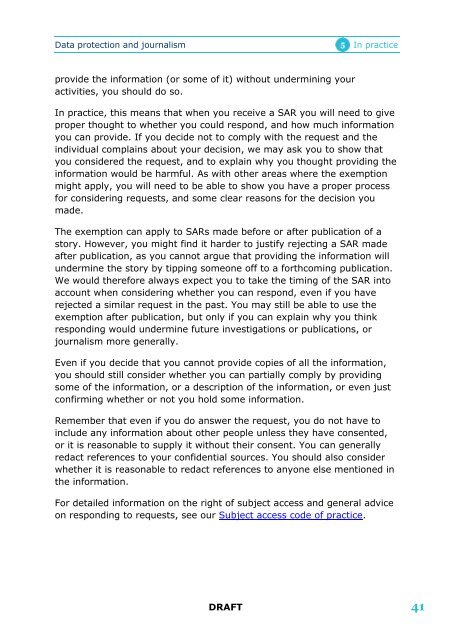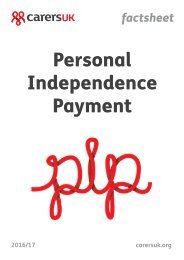data-protection-and-journalism-a-guide-for-the-media-draft
data-protection-and-journalism-a-guide-for-the-media-draft
data-protection-and-journalism-a-guide-for-the-media-draft
Create successful ePaper yourself
Turn your PDF publications into a flip-book with our unique Google optimized e-Paper software.
Data <strong>protection</strong> <strong>and</strong> <strong>journalism</strong><br />
In practice<br />
provide <strong>the</strong> in<strong>for</strong>mation (or some of it) without undermining your<br />
activities, you should do so.<br />
In practice, this means that when you receive a SAR you will need to give<br />
proper thought to whe<strong>the</strong>r you could respond, <strong>and</strong> how much in<strong>for</strong>mation<br />
you can provide. If you decide not to comply with <strong>the</strong> request <strong>and</strong> <strong>the</strong><br />
individual complains about your decision, we may ask you to show that<br />
you considered <strong>the</strong> request, <strong>and</strong> to explain why you thought providing <strong>the</strong><br />
in<strong>for</strong>mation would be harmful. As with o<strong>the</strong>r areas where <strong>the</strong> exemption<br />
might apply, you will need to be able to show you have a proper process<br />
<strong>for</strong> considering requests, <strong>and</strong> some clear reasons <strong>for</strong> <strong>the</strong> decision you<br />
made.<br />
The exemption can apply to SARs made be<strong>for</strong>e or after publication of a<br />
story. However, you might find it harder to justify rejecting a SAR made<br />
after publication, as you cannot argue that providing <strong>the</strong> in<strong>for</strong>mation will<br />
undermine <strong>the</strong> story by tipping someone off to a <strong>for</strong>thcoming publication.<br />
We would <strong>the</strong>re<strong>for</strong>e always expect you to take <strong>the</strong> timing of <strong>the</strong> SAR into<br />
account when considering whe<strong>the</strong>r you can respond, even if you have<br />
rejected a similar request in <strong>the</strong> past. You may still be able to use <strong>the</strong><br />
exemption after publication, but only if you can explain why you think<br />
responding would undermine future investigations or publications, or<br />
<strong>journalism</strong> more generally.<br />
Even if you decide that you cannot provide copies of all <strong>the</strong> in<strong>for</strong>mation,<br />
you should still consider whe<strong>the</strong>r you can partially comply by providing<br />
some of <strong>the</strong> in<strong>for</strong>mation, or a description of <strong>the</strong> in<strong>for</strong>mation, or even just<br />
confirming whe<strong>the</strong>r or not you hold some in<strong>for</strong>mation.<br />
Remember that even if you do answer <strong>the</strong> request, you do not have to<br />
include any in<strong>for</strong>mation about o<strong>the</strong>r people unless <strong>the</strong>y have consented,<br />
or it is reasonable to supply it without <strong>the</strong>ir consent. You can generally<br />
redact references to your confidential sources. You should also consider<br />
whe<strong>the</strong>r it is reasonable to redact references to anyone else mentioned in<br />
<strong>the</strong> in<strong>for</strong>mation.<br />
For detailed in<strong>for</strong>mation on <strong>the</strong> right of subject access <strong>and</strong> general advice<br />
on responding to requests, see our Subject access code of practice.<br />
DRAFT 41




